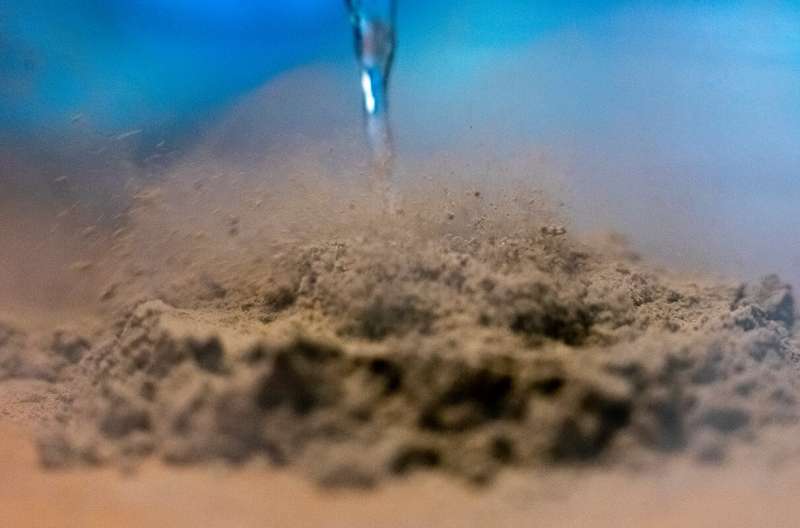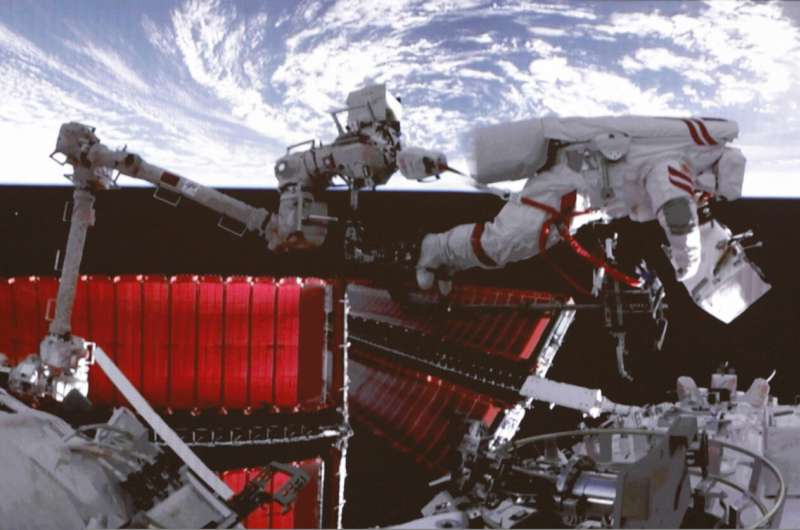
Copernical Team
Liquid nitrogen spray could clean up stubborn moon dust

A liquid nitrogen spray developed by Washington State University researchers can remove almost all of the simulated moon dust from a space suit, potentially solving what is a significant challenge for future moon-landing astronauts.
The sprayer removed more than 98% of moon dust simulant in a vacuum environment with minimal damage to spacesuits, performing better than any techniques that have been investigated previously. The researchers report on their work in the journal, Acta Astronautica.
While people have managed to put men on the moon, they haven't figured out how to keep them clean there. Similar to the clingiest packaging peanuts, moon dust sticks to everything that it touches. Worse than the packing peanuts, the dust is composed of very fine particles that are the consistency of ground fiberglass.
"Moon dust is electrostatically charged, abrasive and gets everywhere, making it a very difficult substance to deal with," said Ian Wells, first author on the paper and a senior in WSU's School of Mechanical and Materials Engineering.
China says will train foreign astronauts for space station

China says it will soon begin training foreign astronauts for trips to its newly completed orbiting space station.
Long a source of national pride and symbol of technological advancement, the Chinese space program is taking on a new diplomatic and political role, much in the way the United States and former Soviet Union leveraged theirs.
Surgeon, scientist named Japan's first new astronauts in 13 years

Japan's space agency JAXA named its first new astronaut candidates in over 13 years on Tuesday, with a surgeon and a climate scientist chosen from more than 4,000 applicants.
Ayu Yoneda, a 28-year-old surgeon for Tokyo's Japanese Red Cross Medical Center, will become just the third woman ever to join the space training programme. Japan's six current astronauts are all men.
She will be joined by Makoto Suwa, 46, a senior disaster risk management specialist at the World Bank, who made the cut after an unsuccessful first application more than a decade ago.
Yoneda said she was "elated and surprised" to learn she had been chosen.
"I felt a sense of responsibility and mission," she told reporters.
Suwa, speaking by video from the United States, said he was "so excited that I haven't been able to sleep".
The pair, chosen from 4,127 applicants, will now begin a two-year training programme and, if successful, could join International Space Station missions and become the first Japanese astronauts to reach the Moon.
Seeing triple
 Image:
Image:
This observation from the NASA/ESA/CSA James Webb Space Telescope features the massive galaxy cluster RX J2129. Due to Gravitational lensing, this observation contains three different images of the same supernova-hosting galaxy, which you can see in closer detail here. Gravitational lensing occurs when a massive celestial body causes a sufficient curvature of spacetime to bend the path of light travelling past or through it, almost like a vast lens. In this case, the lens is the galaxy cluster RX J2129, located around 3.2 billion light-years from Earth in the constellation Aquarius. Gravitational lensing can
AFRL establishes one-stop shop for partnerships
 The Air Force Research Laboratory established a new Strategic Partnering Directorate, or AFRL/SP, to achieve greater alignment, effectiveness and efficiencies in supporting partnership priorities across the Department of the Air Force's science and technology, or S and T, enterprise. The Air Force Manpower and Personnel Directorate signed an organizational change request Dec. 22, 2022, after app
The Air Force Research Laboratory established a new Strategic Partnering Directorate, or AFRL/SP, to achieve greater alignment, effectiveness and efficiencies in supporting partnership priorities across the Department of the Air Force's science and technology, or S and T, enterprise. The Air Force Manpower and Personnel Directorate signed an organizational change request Dec. 22, 2022, after app DARPA, Services Demonstrate Battlefield Airspace Deconfliction Software
 DARPA's Air Space Total Awareness for Rapid Tactical Execution (ASTARTE) program recently demonstrated new automated flightpath-planning software that successfully deconflicted friendly missiles, artillery fire, and manned and unmanned aircraft while avoiding enemy fires in a simulated battle in contested airspace.
In a demonstration held at the U.S. Army's Mission Command Battle Lab, Ft.
DARPA's Air Space Total Awareness for Rapid Tactical Execution (ASTARTE) program recently demonstrated new automated flightpath-planning software that successfully deconflicted friendly missiles, artillery fire, and manned and unmanned aircraft while avoiding enemy fires in a simulated battle in contested airspace.
In a demonstration held at the U.S. Army's Mission Command Battle Lab, Ft. Space Force, Air Force partner to establish new Space Test Course
 The U.S. Air and Space Forces have partnered to create the new Space Test Course, which will instruct Guardians on test and evaluation processes, in order to conduct robust and methodical system testing on space-flight equipment at the Test Pilot School at Edwards Air Force Base, California.
Space Force Vice Chief of Space Operations Gen. David D. Thompson and Air Force Vice Chief of Staff
The U.S. Air and Space Forces have partnered to create the new Space Test Course, which will instruct Guardians on test and evaluation processes, in order to conduct robust and methodical system testing on space-flight equipment at the Test Pilot School at Edwards Air Force Base, California.
Space Force Vice Chief of Space Operations Gen. David D. Thompson and Air Force Vice Chief of Staff Yusaku Maezawa, Entrepreneur and First Private Japanese Citizen to Visit the ISS, Invests U.S. $23 Million in Astroscale
 Astroscale Holdings Inc. ("Astroscale"), the market leader in satellite servicing and long-term sustainability across all orbits, has received an investment of U.S. $23 million from Yusaku Maezawa, the first private Japanese citizen to visit the International Space Station (ISS).
"Mr. Maezawa's investment is a testament to the importance of space sustainability, and we are deeply grateful
Astroscale Holdings Inc. ("Astroscale"), the market leader in satellite servicing and long-term sustainability across all orbits, has received an investment of U.S. $23 million from Yusaku Maezawa, the first private Japanese citizen to visit the International Space Station (ISS).
"Mr. Maezawa's investment is a testament to the importance of space sustainability, and we are deeply grateful SpaceX launches new Starlink 'V2 Mini' satellites into orbit
 SpaceX launched 21 upgraded "V2 Mini" Starlink Internet satellites from Florida's Cape Canaveral on Monday, to boost capacity for the global broadband network.
SpaceX announced "Liftoff!" in a tweet at 6:16 p.m. EST, showing the Falcon 9 rocket lift off from pad 40 against the sunset. The launch was delayed earlier Monday to allow radiation levels to drop following a solar storm.
SpaceX launched 21 upgraded "V2 Mini" Starlink Internet satellites from Florida's Cape Canaveral on Monday, to boost capacity for the global broadband network.
SpaceX announced "Liftoff!" in a tweet at 6:16 p.m. EST, showing the Falcon 9 rocket lift off from pad 40 against the sunset. The launch was delayed earlier Monday to allow radiation levels to drop following a solar storm. Nicola Fox named associate administrator for NASA Science Mission Directorate
 NASA has found its new associate administrator of the Science Mission Directorate in Heliophysics Director Nicola Fox.
Fox will replace acting administrator Sandra Connelly atop the Science Mission Directorate effective immediately, according to a press release from NASA.
NASA administrator Bill Nelson made the announcement on Monday, lauding Fox for the work she has done as dire
NASA has found its new associate administrator of the Science Mission Directorate in Heliophysics Director Nicola Fox.
Fox will replace acting administrator Sandra Connelly atop the Science Mission Directorate effective immediately, according to a press release from NASA.
NASA administrator Bill Nelson made the announcement on Monday, lauding Fox for the work she has done as dire 



































